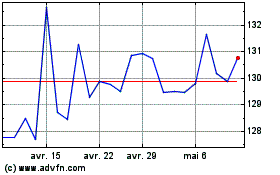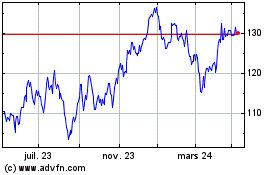Rio Tinto First-Half Earnings, Dividend Fall on Weaker Commodity Prices -- Update
26 Juillet 2023 - 12:11PM
Dow Jones News
By Rhiannon Hoyle
Mining giant Rio Tinto reported a 43% drop in first-half net
profit and pared its payout to shareholders, reflecting a fall in
commodity prices as China's economic recovery faltered.
The world's second-biggest miner by market value on Wednesday
said it made a net profit of $5.12 billion in the six months
through June, down from $8.94 billion a year earlier.
Underlying earnings totaled $5.72 billion, compared with $8.66
billion in the first half of 2022, as prices of aluminum, copper
and, most importantly, iron ore--which accounts for the majority of
Rio Tinto's profits--declined.
It is the company's lowest first-half underlying earnings since
2020, after which commodity prices surged on government stimulus
programs in response to the Covid-19 pandemic. Analysts had
expected first-half underlying earnings of roughly $5.85 billion,
according to 11 forecasts compiled by Visible Alpha.
Directors of Rio Tinto declared an interim dividend of $1.77 a
share, which the miner said was equal to 50% of underlying
earnings, in line with its policy and typical midyear payouts in
recent years. A year ago, Rio Tinto paid out $2.67 a share, also
50% of underlying earnings.
A postpandemic surge in Chinese metals demand predicted by some
miners and traders hasn't materialized, as consumers refrain from
spending and exports slump.
An ongoing downturn in the country's property sector, a big
buyer of industrial metals, has weighed on the economy, which
barely grew in the second quarter from the first quarter. Earlier
this week, one of China's top decision-making bodies signaled plans
to boost the ailing sector, helping to drive up prices of metals
and stocks of miners, including Rio Tinto.
"We are of course deeply engrained in the Chinese economy, it's
our biggest market," said Jakob Stausholm, the miner's chief
executive.
He said he is cautiously optimistic about the outlook for
China's economy. "For sure they have some challenges, but in the
past they have had that and they have managed that well," he told
reporters.
The Anglo-Australian miner makes most of its money from the vast
iron-ore mining operations it runs in remote northwest Australia.
As steel's main ingredient, iron ore is one of the world's
most-traded commodities, and Rio Tinto is the top producer
alongside Brazil's Vale.
While shipments from those Australian operations were 7% higher
in the first half versus a year earlier, the average price Rio
Tinto was paid for that iron ore was 11% lower year over year.
In addition to China's sluggish economic growth, global exports
of iron ore have been strong, with shipments from dominant global
suppliers Australia and Brazil recently estimated to be at or close
to all-time highs, Rio Tinto said last week.
Weaker aluminum prices outweighed Rio Tinto's increased output
of that commodity, too. While the company produced 9% more aluminum
during the period year over year, it was paid 25% less per metric
ton.
"That was the absolute major factor that drove our Ebitda down
period on period," Chief Financial Officer Peter Cunningham said of
the impact of commodity prices on earnings.
Rio Tinto is increasing spending on deals and projects to grow
its production, especially of commodities needed for an energy
transition including a rapid take-up of electric vehicles. That
includes an expansion of copper-mining operations in the U.S. and
in Mongolia, where it says its Oyu Tolgoi business is set to become
the world's fourth-largest copper mine by 2030.
"Rio Tinto has not grown a lot over a decade but actually, this
first half, you really see evidence of profitable growth,"
Stausholm said.
The miner on Wednesday said a test plant at its Rincon lithium
project in Argentina will cost more than previously anticipated,
raising its capital estimate to $335 million from $140 million
previously.
"We were pretty clear when we took over Rincon that we wanted to
go fast," said Stausholm. "We jumped a few steps on its way and
probably didn't do enough engineering," but the miner has also
learned lessons it can use on the full-scale development, he
said.
Write to Rhiannon Hoyle at rhiannon.hoyle@wsj.com
(END) Dow Jones Newswires
July 26, 2023 05:56 ET (09:56 GMT)
Copyright (c) 2023 Dow Jones & Company, Inc.
Rio Tinto (ASX:RIO)
Graphique Historique de l'Action
De Déc 2024 à Jan 2025

Rio Tinto (ASX:RIO)
Graphique Historique de l'Action
De Jan 2024 à Jan 2025
